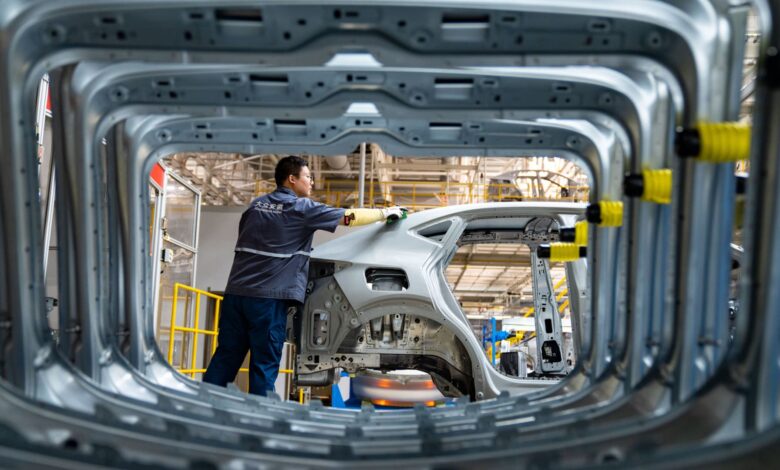Automobile giants are worried about the prospect of heavy fines

Workers produce pure electric vehicles at the Volkswagen (Anhui) factory in Hefei, China, on September 25, 2024.
Photo | Future Publishing | Getty Images
Europe’s leading auto giants appear increasingly concerned about the possibility of heavy fines, especially as demand for electric vehicles increases. falter ahead of the next tightening of carbon regulations.
Car manufacturers operating in Europe face more stringent emissions targets from next year when the average EU emissions limit from new car sales drops to 93.6 grams of CO2 per kilometer (g/km), reflecting a 15% reduction from the 2021 baseline of 110.1 g/km.
Beyond those limits – agreed in 2019 and part of the 27-nation bloc’s ambitions to achieve climate neutral by 2050 – can be heavily fined.
Rico Luman, senior transport and logistics economist at Dutch bank ING, said European carmakers have every reason to be concerned about the scale of the financial penalties.
“The fine is really huge,” Luman told CNBC via video conference. When you calculate it… it’s easily millions of dollars based on the volume they produce.”
Renault Chief Executive Luca de Meo said last month that if electric vehicle sales remain at current levels, the European auto industry could have to pay 15 billion euros ($16.5 billion) in financial penalties. or abandon the production of more than 2.5 million vehicles. Reuters reportedquotes an interview with French radio.

The European Automobile Manufacturers Association, or ACEA, said the industry was lacking “critical conditions” to support a zero-emissions transition, “with concerns about meeting the CO2 emissions reduction targets by 2025 for cars and trucks are increasing.”
The auto lobby group, which represents the likes of BMW, Ferrari, Renault, Volkswagen And Volvowarns that current EU regulations “fail to account for the profound change in the geopolitical and economic environment” in recent years.
ACEA said in a statement published on September 19: “European car manufacturers, united in ACEA, call on EU institutions to introduce urgent relief measures before CO2 targets are met. new for cars and trucks effective in 2025.
Tim McPhie, spokesman for the European Commission, the EU’s executive arm, speak in a press conference late last month that the auto industry still had 15 months to meet the new targets, adding that it was “too early to speculate” on the size of potential fines .
“We have designed these policies in such a way that the industry has time to adapt, the overall economic ecosystem has time to adapt, but of course, we are very sensitive,” McPhie said on September 24. sensitive to the challenges being faced.”
‘A big struggle’
Europe’s leading automakers are competing with one another perfect storm on the challenges on the road to full electrification, including a lack of affordable models, a slower-than-anticipated rollout of charging points and the potential impact of European tariffs on vehicles Electricity made in China.
In crisis Volkswagen and several other automakers, incl Ford And Mercedes-Benz Grouphave it all announced plans to delay previous targets to phase out sales of internal combustion engine (ICE) vehicles in Europe.
“Manufacturers are quite focused on hybrids and conventional ICE vehicles because they are more profitable,” said ING’s Luman.
“In the long term, they need to compete with new players and restructure their organization by moving towards transformation but that is not profitable in the short term,” he continued. “So it was a big struggle.”
EnBW electric car charging station near Weissenfels, Germany.
Sean Gallup | Getty Images News | Getty Images
ACEA speak that the EU’s share of the battery power market has fallen to 12.6% this year, down from 13.9% in 2023, while the bloc’s car sales remain around 18% below pre-pandemic levels in 2019.
Xavier Demeulenaere, vice president of sustainable mobility at S&P Global Mobility, said all European original equipment manufacturers (OEMs) have a “strong incentive” to increase their electric vehicle sales. themselves to reduce average fleet emissions and comply with regulatory targets.
“The slowdown in electrification that we are seeing in 2024, due to the worsening economic situation across Europe and the removal or reduction of subsidies,” Demeulenaere told CNBC by phone. level in some countries, making the situation difficult for most OEMs as it creates demand problems.” .
“But if demand is not there, pooling remains one of the key mechanisms to again mitigate the potential financial penalties expected in 2025,” he added.
Pooling refers to the process in which automakers cooperate to be considered as one entity when calculating their performance against a CO2 emissions target.
Crisis? What crisis?
Not everyone believes that the sales challenge facing the European auto industry is an industry-wide crisis.
Transport & Environment Campaign Group speak in an analysis published Wednesday that the current state of play should instead be considered a “transitional period” in which manufacturers adapt to new regulations and changing Electric vehicle market dynamics.
Volvo Cars Hill Country dealership in Austin, Texas.
Brandon Bell | Getty Images News | Getty Images
Analysts at Transport & Environment say the European auto industry has been planning since 2019 for a CO2 emissions target for next year and manufacturers can avoid paying large fines by selling more hybrid cars and more fuel-efficient cars.
They added: “Car manufacturers also benefit from regulatory flexibility to further (artificially) reduce their CO2 emissions, as well as the option to pool their emissions with other car manufacturers.
“Profitable European carmakers may need to sell fewer polluting SUVs, but that’s the goal of car CO2 regulation.”
Road transport is main contributor transport CO2 emissions in the EU, with passenger cars and light commercial vehicles accounting for almost 15% of total emissions.




